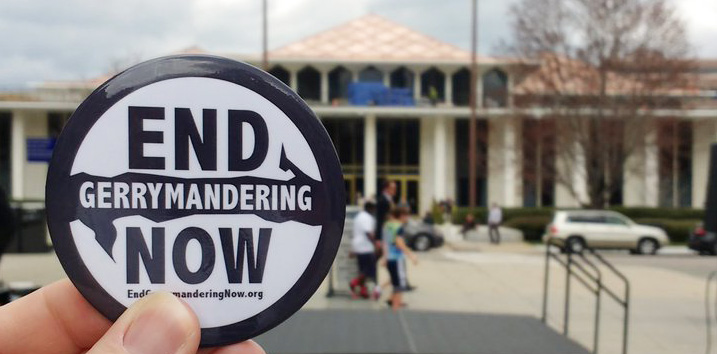Historic court ruling could usher in the end of gerrymandering

RALEIGH – On Tuesday, federal judges handed down a game-changing decision in the fight to end gerrymandering in North Carolina and across the nation.
For the first time in our state’s history, a court ruled that partisan gerrymandering – like racial gerrymandering – is unconstitutional. The decision in Common Cause v. Rucho slams shut the last shadowy refuge of politicians looking to shield themselves from accountability by manipulating our voting maps.
Some background: in 2016, a federal court ruled that the Republican-controlled NC legislature had unconstitutionally gerrymandered our state’s congressional districts along racial lines.
GOP legislative leaders responded by creating a new set of districts that they said would ignore race entirely. Instead, they openly boasted that they would draw a blatant gerrymander designed to benefit their own party at the expense of Democrats, Libertarians and unaffiliated voters.
“We want to make clear that we … are going to use political data in drawing this map. It is to gain partisan advantage on the map. I want that criteria to be clearly stated and understood,” Rep. David Lewis (R-Harnett) told a redistricting committee in February of 2016.
Common Cause NC has been fighting gerrymandering for decades. We advocated for nonpartisan redistricting when Democrats were in power, and continued to do so when Republicans took control. But never before had legislative leaders so brazenly admitted they were gerrymandering North Carolina’s voting districts for partisan gain. That could not stand, so we challenged the legislature’s extreme gerrymander in court.
The likely reason Rep. Lewis was so bold in declaring the legislature’s scheme was that while the courts had made clear that racial gerrymandering is unconstitutional, there had been no definitive ruling against gerrymandering based on the party affiliation of voters. That is, until Tuesday’s decision in Common Cause v. Rucho.
“On its most fundamental level, partisan gerrymandering violates the core principle of republican government … that the voters should choose their representatives, not the other way around,” Judge James Wynn wrote in the court’s scathing rebuke of the legislature’s shameless gerrymander. “Put differently, partisan gerrymandering represents an abuse of power.”
The ruling in Common Cause v. Rucho means that politicians will no longer be free to use partisan gerrymandering to marginalize North Carolina voters. The decision will likely be appealed by legislative Republicans to the US Supreme Court, which may have the final say on the issue.
It is sadly ironic that Republican legislative leaders are the ones clinging to the sinking ship of gerrymandering. We stood with those same Republicans, including Rep. Lewis and Sen. Phil Berger, when they were a legislative minority calling for an end to the Democrats’ gerrymandering. They clearly knew then that gerrymandering has no place in our democracy. Now in power, they have fallen prey to the siren song of gerrymandering, which makes a mockery of elections.
Thankfully, there are still Republican lawmakers who remain consistent in their principled support for fair redistricting. Led by Rep. Chuck McGrady of Henderson County, a quartet of GOP legislators last year filed House Bill 200. That measure would take redistricting power out of the hands of legislators and give it to an independent body that in turn would draw our voting maps free from partisan politics.
House Bill 200 has dozens of bipartisan co-sponsors and enjoys the support of an overwhelming majority of North Carolina citizens. Still, legislative leaders have stubbornly refused to give the bill a vote. But in light of Tuesday’s ruling, now is the time for a common-sense solution to gerrymandering like the one proposed by HB200.
For far too long, gerrymandering has plagued North Carolina, perpetrated by both Democrats and Republicans. Thanks to last week’s landmark ruling in Common Cause v. Rucho, the era of politicians drawing gerrymandered voting maps may finally be drawing to an end.
Jay Gladieux is a board member with Common Cause North Carolina.
See More: Redistricting & Gerrymandering
